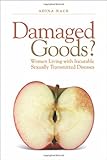Damaged Goods?: Women Living With Incurable Sexually Transmitted Diseases

Product DescriptionHow do women living with genital herpes and/or HPV (human papillomavirus) infections see themselves as sexual beings, and what choices do they make about sexual health issues? Adina Nack, a medical sociologist who specializes in sexual health and social psychology, conducted in-depth interviews with 43 women about their identities and sexuality with regard to chronic illness. The result is a fascinating book about an issue that affects millions around the world, but is all too little discussed. “Damaged Goods?” adds to our knowledge of how women are affected by living with chronic STDs and reveals the stages of their sexual self-transformation. From the anxiety of being diagnosed with an STD to issues of blame and shame, Nack – herself diagnosed with a cervical HPV infection – shows why these women, feeling that they are “damaged goods,” question future relationships, marriage, and their ability to have healthy children.
- ISBN13: 9781592137084
- Condition: NEW
- Notes: Brand New from Publisher. No Remainder Mark.





When I found out that I had an STD this was the first book I read. I would never recomend this book to someboy who is trying to figure out how to deal with the diagnosis of an STD and become comfortable and confidant again. I found the book very negative. It was hard to get through because I was already extremely emotional. I don’t know what I was expecting from a book with this title, but what I got did not make me feel any better about my diagnosis. I would skip this book and stick to more factual books about specific diseases, and healing.
Rating: 1 / 5
In Damaged Goods ?, Dr. Nack combines the tools of a rigorous social scientist with the voice of an empathetic advocate to convey the experiences of women living with chronic STD’s.
She provides readers with a medical, historical and political background to understand HPV and the way in which HPV vaccination campaigns have been constructed. Nack argues that STD’s are strongly stigmatizing to women and that the focus of HPV campaigns has been on presenting the vaccine as a way of preventing cervical cancer instead of portraying the vaccine as an immunization against sexually transmitted disease. She critically questions the consequences of this portrayal and gives policy and research suggestions to improve national public health treatments of this disease.
What makes Damaged Goods ? unique is that it seamlessly accomplishes a multitude of tasks: While providing statistical data, historical, political and medical facts, it focuses on the personal experiences of women living with chronic STD’s. In this way, Nack bridges a gap that is often found between an empirical, academic undertaking and the accessibility of empirical research to women who seek to understand their diagnosis and their daily experiences with their disease.
A further strength of this book is that Nack uses her empirical findings and criticism in a constructive way: She gives specific policy and research recommendations for improvements to sexual health education, doctor-patient communication and interaction style. Finally, she questions the HPV-vaccine campaign for presenting itself as a cervical cancer vaccine and disassociating itself with STD stigma. Although some families might be more willing to encourage their daughters to get vaccinated when the term ‘sexually transmitted disease’ is not mentioned, are national health campaigns avoiding the realities of STD’s and the sexual behavior of young women? Are they leading Americans to believe that HPV causes all cervical cancers? These are questions that Nack discusses, thereby initiating an important dialogue about the national understanding of HPV and personal encounters of this prevalent, stigmatizing and all-too-little-talked about disease.
Rating: 5 / 5
This book is no doubt an open account of attitudes held socially and internally by the women who live with incurable STD’s. Nack has created an outlet for frustration, fear, anxiety, and a floodgate of emotions held by these women and also serves as support to others that may seek solace from shared experiences. Not only is this book helpful to those women and men who need allies in the struggle to regain their sexuality, but also to those loved ones who may need help to understand what social stigma is, and how to support appropriately. I encourage women and men who live with these conditions to read all the material they can both research and honest accounts that Nack has brought here. This is ethnography at its best.
Rating: 5 / 5
After reading this book for a class, I was amazed at how insightful and helpful this book is to not only someone living with HPV or HSV, but also to all of those people who they encounter and are possibly affected by it (significant others, doctors, parents, friends, etc. ). Adina Nack nails every single feeling and account of women going through this painful experience, and brings it into the light of sympathy, not judgement. The stigma that goes along with this situation is wrong, hurtful and unfair. Nack’s efforts to de-stigmatize this problem are impressive and encouraging and her words really have something for everyone to benefit from. The jokes need to stop. The ignorant comments need to stop. The stigma needs to stop. This book is definitely amazing and should be experienced by everyone because everyone is affected in one way or another.
Rating: 5 / 5
Reading a book that balances logos and pathos in such a compelling way is a rare pleasure indeed. Dr. Nack’s study on STD’s integrates scholarship and heart so seamlessly that the research presents itself with a sense of emotional and social urgency: Help women to empower themselves in the face of personal and medical challenges, and remove the stigma associated with STD’s by challenging the public’s perspectives. Dr. Nack’s auto-ethnography regarding her experience with an STD further evidences her deep personal investment in the subject and connects her with the dozens of women who share their stories in interviews. Possessing little knowledge on the subject of STD’s, I expected Damaged Goods to be somewhat “over my head. ” It is indeed expertly-researched and scientifically sound, but without pretense. It is a fresh and revealing read, compelling enough to keep you awake at night turning pages and challenging personal perspectives.
Rating: 5 / 5